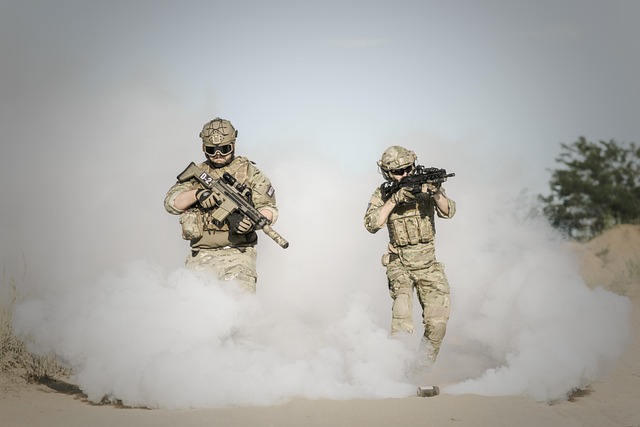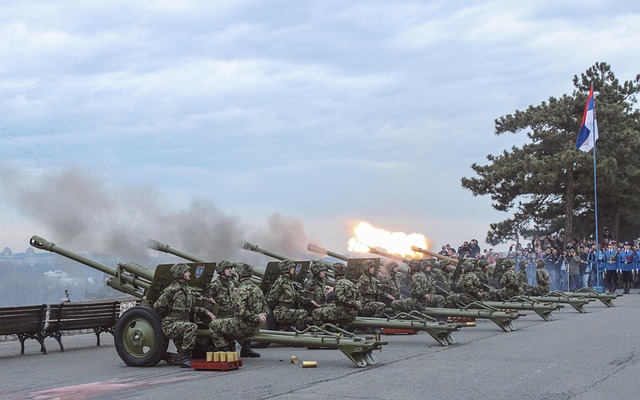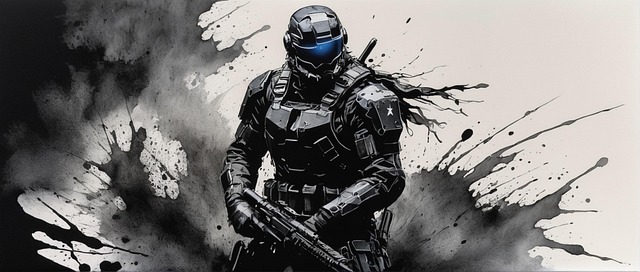The US Army Special Forces, known as "Green Berets," are an elite unit with a rich history in unconventional operations worldwide. In the digital age, they've adapted to cyber warfare, integrating advanced technologies for network security and infiltration. Their rigorous training combines hacking skills with military protocols, making them key players in missions alongside units like Delta Force. Special Forces leverage state-of-the-art tools for penetration testing and data exfiltration while navigating ethical challenges in cyberspace, where anonymity and swift attacks can pose risks to civilian infrastructure and privacy. Robust internal oversight is vital to ensure their operations maintain proportionality and strategic advantage.
“Unleashing digital might in the shadows of modern warfare, the US Army Special Forces stand at the forefront of cyber operations. This article delves into the intricate world of special forces cyber warfare, exploring its roots within the unique capabilities of these elite soldiers. From understanding their comprehensive training to the cutting-edge technologies they wield, we uncover how Special Forces adapt to the evolving digital battlefield. Additionally, ethical dilemmas and the challenges they face in this clandestine domain will be discussed, providing a comprehensive overview of their crucial role.”
- Understanding US Army Special Forces: A Brief Overview
- The Evolving Role of Cyber Warfare in Modern Conflict
- Special Forces Training and Skills for Cyber Operations
- Equipment and Technologies Employed by Special Forces in Cyber Warfare
- Ethical Considerations and Challenges in Special Forces Cyber Warfare
Understanding US Army Special Forces: A Brief Overview

The US Army Special Forces, often referred to as “Green Berets,” are a unique and highly specialized component of the American military. This elite unit is renowned for its versatility and expertise in conducting unconventional operations worldwide. Special Forces operatives undergo rigorous training, mastering skills such as language proficiency, counterinsurgency tactics, and technical intelligence gathering, enabling them to operate independently or alongside conventional forces. Their adaptability allows them to engage in a wide range of missions, from direct action raids to advisory roles, making them a formidable asset in modern warfare.
With roots tracing back to World War II, when special units played pivotal roles on various fronts, the US Army Special Forces have evolved significantly over time. Today, they are at the forefront of cyber warfare, leveraging their expertise to counter digital threats and protect critical infrastructure. Veteran benefits for special ops personnel are extensive, recognizing the unique challenges and sacrifices made by these individuals, further solidifying their crucial role within the military chain of command.
The Evolving Role of Cyber Warfare in Modern Conflict

In today’s digital age, cyber warfare has emerged as a critical aspect of modern conflict, reshaping the way us army special forces conduct operations. The evolving landscape of cyberspace presents unique challenges and opportunities for these elite units, requiring them to adapt their strategies and acquire specialized skills. Special missions command within the US Army Special Forces has recognized this shift, focusing on integrating cyber capabilities into their already formidable arsenal.
The special ops combat records highlight numerous instances where cyber warfare played a pivotal role in covert operations, particularly during the war on terror. Secret military bases and hidden commands around the globe have been instrumental in developing cutting-edge technologies to disrupt enemy networks, gather intelligence, and execute precise strikes. This integration of cyber power into special forces operations has proven to be a game-changer, offering unprecedented levels of precision and secrecy in modern warfare.
Special Forces Training and Skills for Cyber Operations

The US Army Special Forces, known for their exceptional capabilities and versatility, undergo rigorous training to excel in various domains, including cyber warfare. The selection process for special forces is notoriously demanding, ensuring only the most capable individuals are chosen. This intense training prepares them for the unique challenges of operating in the cyber realm, where they must possess a blend of technical skills and unconventional thinking. Special Forces members learn to navigate complex digital landscapes, leveraging their expertise in hacking, network security, and data exploitation.
Their proficiency extends beyond basic computer literacy; it involves deep understanding of military chain of command protocols and the ability to adapt to dynamic operational environments. This specialized training enables them to operate as cyber specialists within special operations units like US Army Delta Force, providing crucial support during missions that require disruption or control over enemy networks. Their skills are cultivated through hands-on experience, simulations, and real-world scenarios, ensuring they can effectively engage in digital combat while maintaining the secrecy and precision demanded of special forces operations.
Equipment and Technologies Employed by Special Forces in Cyber Warfare

The US Army Special Forces, known for their unconventional warfare expertise, have adapted to the modern digital age by integrating advanced technologies into their cyber operations. Their tactical gear for soldiers includes state-of-the-art communication devices, enabling secure and rapid information exchange during missions. These special mission units rely on sophisticated software and hardware tools designed for penetration testing, network security, and data exfiltration—essential skills in the fight against cyber threats.
Special forces operators undergo rigorous training to qualify for these specialized units, mastering not just physical combat but also digital warfare tactics. Their qualifications encompass a deep understanding of computer networks, cryptography, and malware development, allowing them to adapt quickly to evolving cyber landscapes. Drawing from lessons learned during World War II by special units in ww2, modern special forces have become adept at navigating complex digital environments, ensuring they remain one step ahead in the ever-shifting realm of cyber warfare.
Ethical Considerations and Challenges in Special Forces Cyber Warfare

The ethical landscape of special forces cyber warfare presents a complex web of challenges. As US Army Special Forces operate in the digital realm, they must navigate a delicate balance between gathering sensitive data and preserving integrity. The nature of their mission often involves infiltrating enemy networks, which raises profound questions about proportionality and the potential for collateral damage to civilian infrastructure or personal privacy.
These operations, crucial for achieving strategic advantages in modern warfare, also pose significant risks. Managing the ethical complexities is further complicated by the fluid nature of cyber space. Unlike traditional military engagements, cyber warfare allows for anonymity and swift attacks on critical systems. This capability can be employed to disrupt enemy communications, but it also raises concerns about the potential for misuse, such as targeting innocent individuals or disrupting essential military supply operations and civilian infrastructure—aspects that demand meticulous consideration and robust internal oversight mechanisms within special forces units.
The US Army Special Forces, with their diverse skill sets and global reach, play a pivotal role in modern cyber warfare. As conflicts increasingly move online, their expertise in understanding complex technologies and operating in sensitive environments is invaluable. Through rigorous training, specialized equipment, and ethical awareness, Special Forces are equipped to defend against and disrupt cyber threats worldwide, ensuring national security in the digital age.
